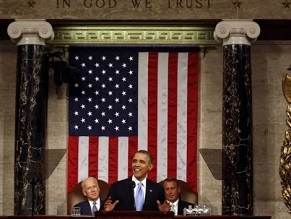|
World Jewish News

US President Barack Obama delivers the State of Union address before a joint session of Congress in the House chamber Tuesday, January 28, 2014, in Washington, as Vice President Joe Biden, and House Speaker John Boehner of Ohio, listen (photo credit: AP/L
|
Obama promises security for ‘Israel – a Jewish state’
29.01.2014, Israel and the World President Barack Obama delivered a brief but ringing recognition of Israel as a Jewish state during his State of the Union address Tuesday night, reinforcing a key Israeli negotiating point in the ongoing talks with the Palestinian Authority.
“As we speak, American diplomacy is supporting Israelis and Palestinians as they engage in difficult but necessary talks to end the conflict there; to achieve dignity and an independent state for Palestinians, and lasting peace and security for the State of Israel – a Jewish state that knows America will always be at their side,” Obama told both houses of Congress, gathered for the annual report.
The president’s affirmation of support garnered a standing ovation from both Democrats and Republicans.
Palestinian recognition of Israel as a Jewish state has been a red-line demand for Israeli negotiators throughout the past six months of the nine-month period during which both sides have agreed to hold talks.
Speaking earlier Tuesday, Prime Minister Benjamin Netanyahu told an audience at the Institute for National Security Studies that the first of Israel’s two demands in negotiations is “recognition of Israel as the national state of the Jewish people.”
Netanyahu said that the refusal of Palestinians and their supporters to recognize Israel as the Jewish homeland “is the root of the conflict.”
“When we talk about an agreement, we’re talking about an agreement where we will be asked to recognize a Palestinian national state. Shouldn’t we demand that the Jewish national state be recognized as well?” Netanyahu added.
Obama’s administration – and first and foremost Secretary of State John Kerry – have devoted intense effort in recent weeks toward bridging the gaps between the Palestinian and Israeli negotiating positions.
On Tuesday, Kerry met with a group of some 30 clergy members and scholars representing Jewish, Muslim and Christian communities in America in order to call upon them to help the administration advance the peace process.
The gathering, held at Georgetown University and hosted by the university’s president, was designed to further interfaith engagement around the peace process, and participants said that there was a clear emphasis on encouraging dialogue within and among faith communities in the United States.
In his remarks, Kerry offered enthusiasm and hope for the process and outlined what might be gained from a final status agreement. Some of the opportunities he identified included Israel being able to make peace and expand its relationships with the entire Arab and Muslim community, trade with foreign nations and Israeli GDP increasing overall.
The State Department has recently boosted its efforts to support the peace process through community outreach, bringing aboard non-pulpit clergy and other faith leaders to engage communities.
“The premise of the discussion seemed to be about the secretary’s and State Department’s desire to bring faith leaders into the dialogue to build the community level so that its not just political leaders but a public discourse,” said Rabbi Julie Schonfeld, executive vice president of the Rabbinical Assembly.
By Rebecca Shimoni Stoil
The Times of Israel
|
|
